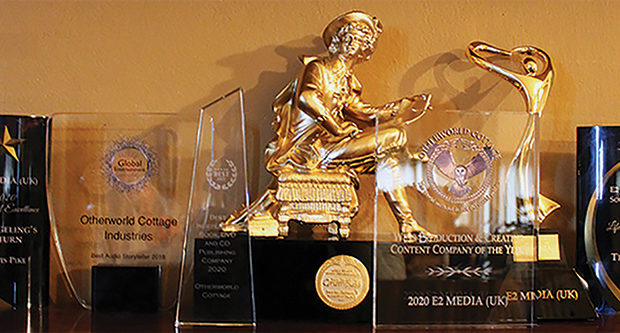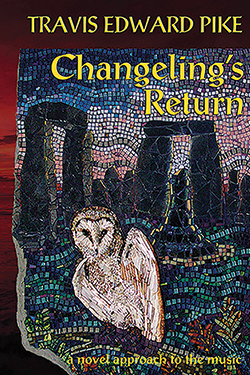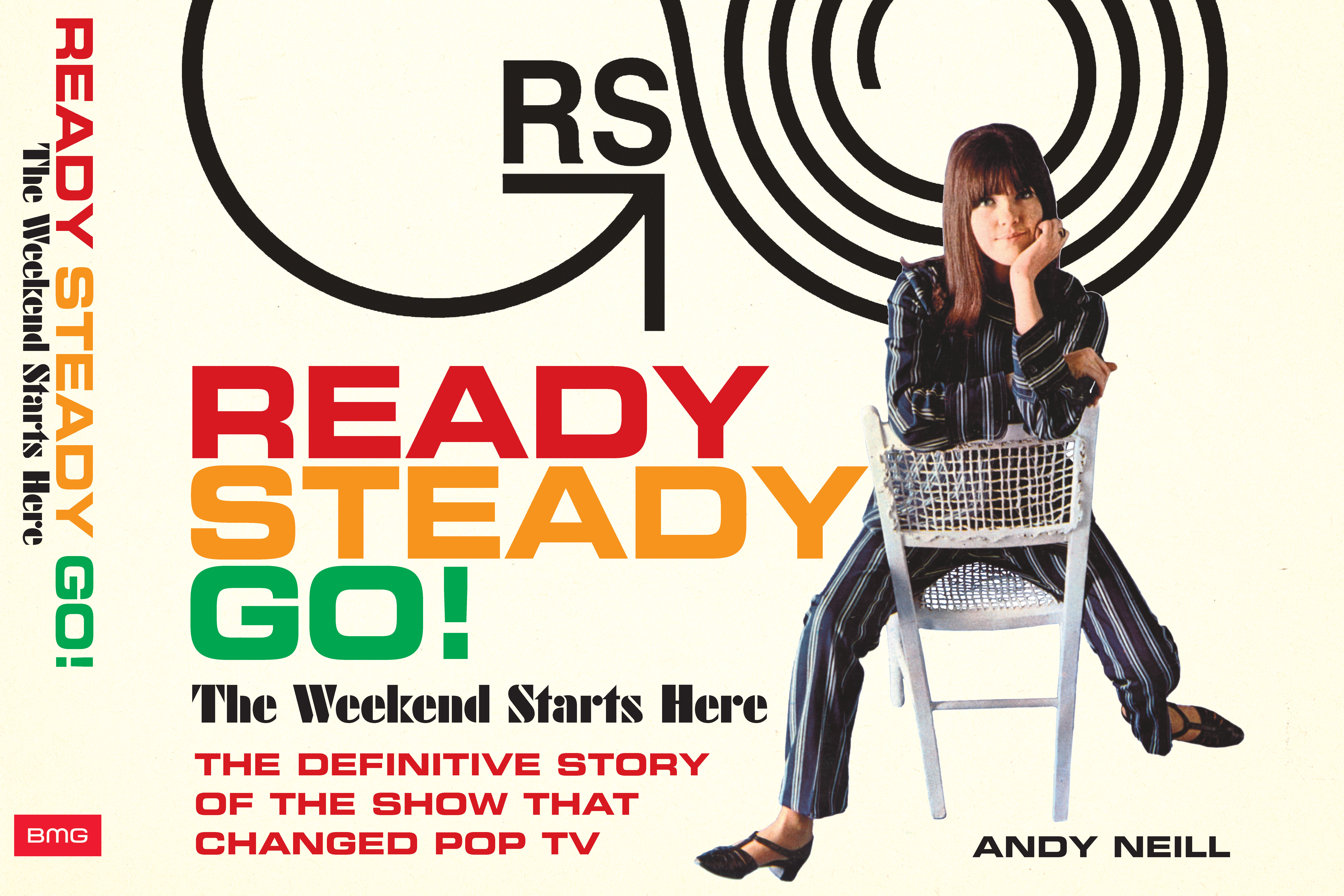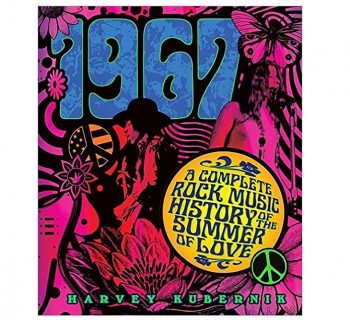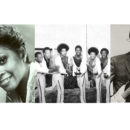I’ve known Travis Pike for decades. Since he founded Otherworld Cottage Industries in 2013, he’s published my books on The Beatles, The Doors, and now Docs That Rocks, Music That Matters, which he called “the documentary music history book for the 21st century.” Pike is a music business veteran, having logged nearly 60 years in the trenches, a Hollywood multi-hyphenate in complete control of his legacy and catalog of stories in rhyme, movies and books. His Otherworld Cottage Industries has been recording and releasing music albums of his original audience favorites from over a half century ago.
I wrote the Afterword to his 2018 memoir, 1964-1974: A Decade of Odd Tales and Wonders, in which he detailed how he came to write the title song for the 1964 Pike Productions 28-minute action featurette Demo Derby, that played in theaters across the United States, often billed with box office smashes like Robin and the Seven Hoods, starring Frank Sinatra; Viva Las Vegas, starring Elvis Presley; and ultimately, with the Beatles Hard Day’s Night. That rare Pike Productions recording of the Rondels “Demo Derby” is still sold online, and the Demo Derby 50th Anniversary Edition video is sold through Otherworld Cottage Industries.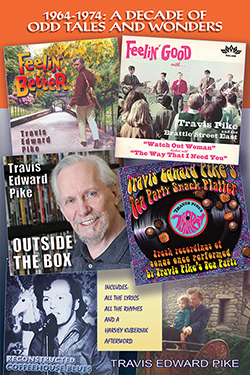
Travis never saw Demo Derby in a theater, because in 1964, he was in the U.S. Navy, stationed on the shore of the Baltic Sea, in the British Zone of West Germany where, in his off-duty hours, he was booked as Teddy, the Twist Sensation from the USA, generating interest from Polydor and Phillips Records, but an auto accident ended that adventure, resulting in Travis being shipped to Chelsea Naval Hospital, near Boston, for bone graft surgery on his left ankle. While recuperating in the orthopedic ward, he composed several novelty songs, and the Red Cross began wheeling him to other wards to entertain the sick and wounded. It was there Travis composed the ten songs for his father’s widescreen, rock ‘n’ roll theatrical feature film, Feelin’ Good, in which Travis performed eight of them with the Brattle Street East, and his other two songs, including the title song, were performed by the winners of the First Massachusetts Jaycees Battle of the Bands, The Montclairs.
Q: When your father produced the film, he was already a well-respected member of the Massachusetts TV and film community. What in his background led to this movie?
A: “Me, I suspect. He said as much in one of the many interviews that appeared in the Boston newspapers at the time. He saw me sing a guest set at Natick High School, and when the student body went wild, it was a revelation to him. He’d never seen or heard me perform live before, and he thought if he could capture that on film, it would be a hit. And being his son, he knew he could get me to do it for scale.”
Q: Talk to me about filming and singing in Feelin’ Good. We don’t hear a lot about the Massachusetts pop and rock music scene, except for the psychedelic inspired bands, but you always operated in the modern song format, and that movie has a cult following.
A: “I don’t know if that movie ever earned a cult following, but I think the idea that there was such a movie, made entirely in Greater Boston in 1966, featuring pop music styles of the times, has created a cult following of people who wished they’d seen it.
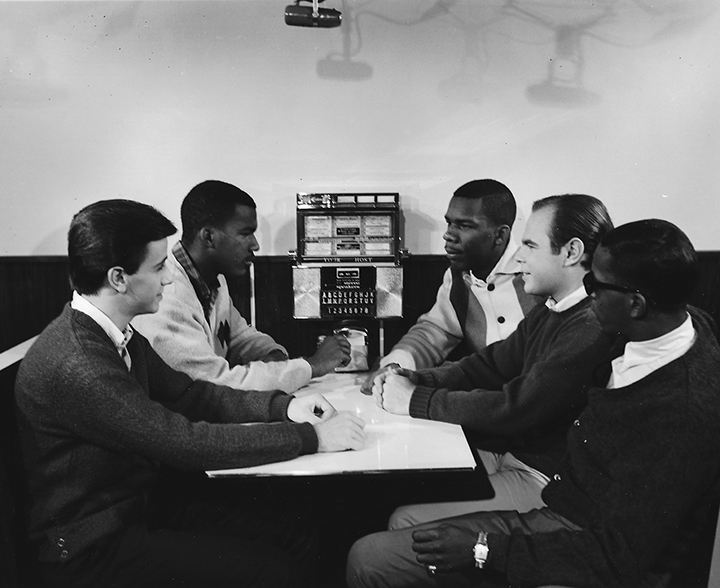
Production still of five of the Montclairs at their favorite pizzeria from the 1966 movie FEELIN’ GOOD; Courtesy of Travis Pike
“A major sub-plot of the movie was the Battle of the Bands contest, and in the story, The Montclairs were the local favorites. Pike Productions shot extensive footage at the Battle of the Bands in Weymouth, Massachusetts, and played their live, Battle of the Bands footage for me, when I wrote their songs. They played themselves, three black singers and three white musicians from Waltham, Massachusetts. The songs I wrote for them were written after they won. My father wanted their parts in the movie to represent them, their talent, aspirations and dreams, an honest look at the young people who made up the group. That attempt at cinema verité killed us in the South. The Montclairs frequently met after rehearsals and before gigs in a local pizzeria, where they’d take a booth, order a couple of pizzas, and talk.
“But 1966 was a tough year in the Civil Rights movement. It was the year that Stokely Carmichael, Chairman of the Student Non-Violent Coordinating Committee, coined the phrase, “Black Power.” In such a climate, seeing blacks and whites sharing a pizza, in a part of the country where they were not even allowed to drink from the same water fountains or sit at the same lunch counters, might well have been inflammatory to either side of the Civil Rights issue. The distributor who handled Feelin’ Good for Southern theater chains asked my father to cut the sequence. He didn’t, and so the film was rarely booked in the South.”
Honorably discharged from the Navy in time to attend the 1966 Feelin’ Good premiere, that fall Travis began singing songs and playing guitar as a solo act in Boston coffee houses. By the following year, he’d formed his all-original rock band that came to be known as Travis Pike’s Tea Party. Regularly booked at New England colleges and coffee houses, they recorded “If I Didn’t Love You Girl” and its flipside “The Likes of You,” with Alma Records in 1967, and in 1968, played at the Psychedelic Supermarket, landed WBZ-TV pilots for Here and Now, a comedy-variety series, and when that show was cancelled, packed up and moved to Southern California.
Travis inherited a few badly aged reels from Feelin Good, had them restored at Deluxe, and posted six music clips on Youtube. Those clips inspired Tim Perlich to report in his online November 7, 2016 edition of The Perlich Post, “The best music video of 2016 was actually shot in 1966,” and he advised his readers to “Check out the amazing 50-year-old footage of Boston’s Travis Pike and the Brattle Street East playing ‘Watch Out Woman’.” Now, more than 10.5K have checked it out, and in 2017, that Youtube clip inspired State Records (UK) to license and release the original mono optical soundtrack recording of the never-before-released “Watch Out Woman,” that ended up listed at number three in the Shindig! magazine Best of 2017 issue, calling attention to all his Travis’ early recordings.
Most rare and sought by collectors is that 1967 Alma Records 45 of Travis Pike’s Tea Party’s “If I Didn’t Love You Girl” and “The Likes of You,” recorded at AAA Studios in Boston. But shortly after that, WBZ Radio 103, then the number one rock and roll radio station for all New England and beyond, abandoned their rock format, and WRKO, having bought out popular deejay Arnie Ginsberg’s contract at WMEX, became Boston’s top rock station, and WBZ-TV dropped the TV show.
Still, “If I Didn’t Love You Girl” was well-received at the First Annual Boston Pop Festival, but the record never charted in the US. Today, that original Travis Pike’s Tea Party Alma Records recording of “If I Didn’t Love You Girl,” has appeared in three compilation albums: Sixties Rebellion, The Backyard Patio, (Germany), 1994; London Records Tougher Than Stains (UK); 1995, and as recently as 2017, in the new untouchables le beate bespoké album, (UK), and a new untouchables Mousetrap Music 45 rpm single featuring that original recording on its “A” side.
In 2003, The Syrups, a group for which Travis’ brother Adam composed songs, sang, and played keyboards, recorded a cover of “I Didn’t Love You Girl,” for the Beck Records album titled The Syrups, produced and engineered by Geoff Emerick, whose four Grammy Awards included Best Engineered Non-Classical Album Awards for 1968’s Sgt. Pepper’s Lonely Hearts Club Band, 1970’s Abbey Road, and 1975’s Band On The Run. Travis and his brother Adam covered it in the Travis Edward Pike’s Tea Party Snack Platter, album released by Otherworld Cottage Industries in May, 2014. That original Alma recording was subsequently named in Shindig! magazine’s February 2020, issue #100 in their article “THE HOT 100, The Soundtrack of Our Evolution.”
At a party for their friends in the Hollywood Foreign Press, hosted by a German couple living at the top of Nichols Canyon in Hollywood, Travis played a few of his songs, finishing up with “End of Summer,” composed with verses in both German and English. One of the guests was filmmaker Gerard Alcan, who was co-producing, with investigative reporter Ted Charach, a documentary titled The Second Gun, a controversial probe into irregularities in the investigation of the assassination of Robert Kennedy, Gerard excitedly proclaimed “End of Summer” was the Zeitgeist he needed for his film. The Hollywood Foreign Press guests agreed enthusiastically, but Travis, concerned that his lovely song would be forever linked to that tragedy, only agreed on condition that he was selling synchronization rights to the instrumental music for the film and not authorizing use of the lyrics or vocal performance, making it Travis’ first Hollywood music score. Ultimately, The Second Gun was nominated (but didn’t win), the Golden Globes Award for Best Documentary Film.
Familiar with his music, I learned more about Travis’ career in the film industry when he submitted the final chapter to Docs That Rock, Music That Matters, discussing his “fifty years in and out of indie music and movie production,” and his time as Director of Production for Cine-Media International, recording the music and directing the Cine-Media Country Music Variety show Fandango, featuring guest star, Barbi Benton in 1981.
In 1984, he directed The Ventures – NASA 25th Anniversary music video, co-produced with our mutual friend, David Carr, who played keyboards on a number of Ventures albums, and in 1997 conducted the music for Travis’s live world premiere benefit performance of Grumpuss for the Save the Children Fund at Blenheim Palace, a world heritage site, home of the Dukes of Marlborough and birthplace of Sir Winston Churchill, where Travis not only performed his entire original epic narrative rhyme from memory, but for which he’d composed the Grumpuss theme, produced, and directed the digibeta video recording of the show, and released it through Otherworld Entertainment Corporation in 1998. In the 1999 Chicago Film Festival, that production of Grumpuss won an INTERCOM Silver Plaque Award for Special Achievement—Writing.
In 2005, he and director Jo Christensen co-produced and co-wrote the New Playwrights Foundation production of Volunteers for Verdi, edited by Travis, that in 2006 won two Certificates of Excellence at the US/International Film and Video Festival, but in this interview, I’ll be focusing primarily on his music, released since he founded Otherworld Cottage Industries.
In 2013, you teamed with your youngest brother, Adam, to record your back catalog of audience favorites from your performances from the mid to late sixties. I made it to a few of those 2013-2016 sessions, and learned that in your collaborations with Adam, you were not only producing, recording, and mixing sixties audience favorites, and new material too. Are we listening to apples and oranges here?
A: “Not really. Most of the songs we recorded, I composed and arranged between 1964 and 1974. Few were ever recorded. Our new recordings, released through Otherworld Cottage Industries, include some songs that evolved significantly since those early days, and have benefitted enormously from Adam’s technical skills and musical talent.”
Q: Today, your back catalog recordings are reaching new ears and record collectors, and your few early singles are commanding big bucks on auction markets. What’s it like to be getting queries on stuff that goes back before the Beatles came to America?
A: “Bittersweet. I’m delighted that the songs are finally getting the recognition I always thought they deserved, and some fans are really excited about that, but back when they failed to chart, I didn’t earn any royalties, and I don’t earn any royalties from records sold at auction. It’s artistically gratifying, but financially rather sad.”
Q: Tell me about the six current albums in your Otherworld Cottage music catalog.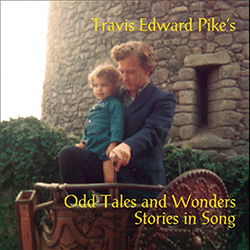
“Our first album was Odd Tales and Wonders, Stories In Song © 19 September 2013. Its song ‘Loup Garou’ is number one in my Youtube Top Ten, but when I introduced it to Boston coffee house crowds in 1967, it was ‘The Dark Old House,’ made spooky by my vocal performance, until Adam and I recorded it in 2013, because the music sounded fantastic, but my lyrics were weak. Without knowing what terror lurked inside ‘The Dark Old House’ in the bayou, it just wasn’t spooky enough.
“I decided it needed a monster. French and Cajun folklore include tales of werewolves, so I rewrote the lyrics and retitled the song, ‘Loup Garou.’ With a rougarou prowling the bayou, the song didn’t need a ‘Dark Old House’. It only needed me to sing it in a passable Cajun accent and add a small crowd to join in the chorus. Now, it’s one of my favorite original songs, but I’m still surprised it’s number one.
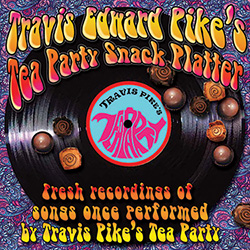 “Our second album, Travis Edward Pike’s Tea Party Snack Platter, © 30 April 2014, has four songs in my Youtube Top Ten list; ‘What’s the Matter with Your Mind’ at #2; ‘If I Didn’t Love You Girl’ at #3; ‘You Got What I Need’ at #8; and ‘Oh Mama’ at #9. For this album, we tried to sound as much like Travis Pike’s Tea Party as we could, and in Lee Zimmerman’s review in the April 2018 issue of Goldmine Magazine, he wrote ‘Prior to claiming a career as a storyteller and composer, Pike began his musical journey at the helm of a Boston band modestly dubbed Travis Pike’s Tea Party. Though they only released one single, and their tenure was brief, lasting only from 1967-68, they still sound like they could have been worthy contenders as far as that archival era was considered. Indeed, all the songs included herein are radio worthy and hold up surprisingly well, even some 50 years past their prime. Timeless and tuneful, these re-recordings compare favorably with anything offered up by The Monkees, The Raiders, The McCoys, The Standells and others of that ilk.’
“Our second album, Travis Edward Pike’s Tea Party Snack Platter, © 30 April 2014, has four songs in my Youtube Top Ten list; ‘What’s the Matter with Your Mind’ at #2; ‘If I Didn’t Love You Girl’ at #3; ‘You Got What I Need’ at #8; and ‘Oh Mama’ at #9. For this album, we tried to sound as much like Travis Pike’s Tea Party as we could, and in Lee Zimmerman’s review in the April 2018 issue of Goldmine Magazine, he wrote ‘Prior to claiming a career as a storyteller and composer, Pike began his musical journey at the helm of a Boston band modestly dubbed Travis Pike’s Tea Party. Though they only released one single, and their tenure was brief, lasting only from 1967-68, they still sound like they could have been worthy contenders as far as that archival era was considered. Indeed, all the songs included herein are radio worthy and hold up surprisingly well, even some 50 years past their prime. Timeless and tuneful, these re-recordings compare favorably with anything offered up by The Monkees, The Raiders, The McCoys, The Standells and others of that ilk.’
“My Reconstructed Coffeehouse Blues, © 19 June 2014, has only one song on my Youtube Top Ten list, ‘Sing a Song of Blues’ at #5. The newest song on the album, it was never played in coffee houses or by Travis Pikes Tea Party, but it really doesn’t matter if a veteran is returning from Vietnam, Kosovo, Iraq, Afghanistan, or some other war zone, repatriation is difficult when trying to re-adjust to a relatively peaceful civilian life that has become totally foreign. Post-traumatic stress disorder is real and in ‘Sing a Song of Blues,’ I try to view an American veteran from his or her perspective.
“All the rest of the songs I originally sang finger-picking or strumming my guitar, so when you hear Adam’s fretted or fretless bass, drums, piano, organ, harmonium, electric rhythm or lead guitar, his creative contributions are tasteful and obvious. And he is not to be blamed for the toy hammer sounds you hear in ‘You and I Together.’ I played them whenever Travis Pike’s Tea Party performed that song live, and I am also responsible for orchestrating the recorded audio effects of helicopter gunships, machine gun fire, jet aircraft, rockets, and napalm explosions for the bridge in ‘Don’t You Care at All?’ As for the rest, Andy Pearson wrote in his April 2018 Fear and Loathing Fanzine review, ‘While there’s more instrumentation added to these versions, it works really well.’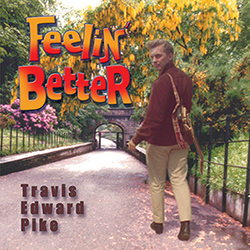
“Feelin’ Better © 24 September 2014, is another album with only one song in my Youtube Top Ten playlist, ‘Things Aren’t Always What They Seem’ (AKA ‘Watch Out Woman’ in the movie Feelin’ Good), is listed at #10. In the April 2018 issue of Goldmine quoted previously, Lee Zimmerman reported Feelin’ Better had ‘songs written for a proposed reunion with Pike’s overseas ‘60s back-up band, The Five Beats. Some songs made it to the score of a cult film called Feelin’ Good, and all boast hit potential, thanks to this series of perky, punchy performances by this current combo...Pike may not have gotten his due early on, but this belated return makes the wait worthwhile.’
“The Feelin’ Better album includes seven songs I sang in the 1966 movie, but recorded the way they would been, if recorded by The Five Beats, my 1964 German-Italian showband, sounding more like the fifties than the sixties, especially ‘Rock ‘n’ Roll,’ one of my favorites, and ‘End of Summer’ complete with my English and German verses. I composed ‘Feelin’ Better’ rather than record ‘Feelin’ Good.’ The Monclairs’ recording made that title song, and now you may hear their original performance on Youtube!
“Outside the Box, © 18 April 2016 is my most eclectic album, featuring jewels drawn from deep in the vault, including the three never previously recorded songs in my Youtube Top Ten, to wit: ‘Lovely Girl I Married,’ is #4; ‘Andalusian Bride Suite’ is #6 and ‘Star Maker’ is #7. ‘Lovely Girl I Married’ was originally ‘Look Who’s Here’ (‘who’ being a neighbor’s daughter). I loved the musical composition, but Adam and my wife, Judy, both rejected its lyrics. Intended to be a coming-of-age song, they saw it as appealing to pedophiles, even though the song was about adults who, when they were children, were forbidden to play with each other, and were now free to spend time together. I shelved it, in the hope that one day I’d come up with new lyrics that fit the music. Finally, I did, and with its new lyrics, retitled it ‘Lovely Girl I Married’ and put it on a gold record and gave it to my wife for our 50th anniversary and now it is one of my most popular ballads.
“Number six on my Youtube Top Ten list, ‘The Andalusian Bride Suite,’ was originally my first fully orchestrated tone poem composed in 1973-74, titled ‘Nude Descending a Staircase,’ inspired by the Marcel DuChamp painting ‘Nude Descending a Staircase, no. 2’ that I first saw in a CalPoly class in Modern Art History. Its futuristic style appealed to my continuing interest in animated motion pictures. Lacking the skill to play or record my notation, I nevertheless kept writing parts until I finally added the song and re-titled it ‘The Andalusian Bride Suite.’ Adam was fascinated by the score and wanted to record it. Alas, I had only recently learned to write musical notation when I composed my opus, and there were a number of subtleties I hadn’t grasped.
“I wrote each of the three main sections all starting on page one (but I cleverly labelled the song an ‘Insert,’ thinking that would indicate it came between the other two sections, but 2016 was more than 40 years since I’d composed the three sections, and I forgot. Worse still, having run out of staves on my composition paper, I wrote the parts for the rest of the instruments on separate sheets, starting each on its page one, only sometimes noting for what instrument the part was written. As Adam (a sight-reader), played them all, I did remember where some came in, and together we managed to place the others by numbering the staves (Adam’s idea). Then fully reassembled, we recorded it, and damned if we didn’t think it sounded brilliant! And, judging by its current position in my Youtube Top Ten list, others agree.
“As for ‘Star Maker,’ I wrote the original lyrics and chord changes in the mid-seventies, remembered how to play it, and found its lyrics more appropriate now than ever. Way back when, getting a disc jockey to play your record was a good way to launch a musical career. Today, radio playlists are created by a handful of sources and sent across the country, so it’s not easy to find a deejay anywhere who has control over his playlist. For this old retread, trying to gain traction in this cookie cutter world, finding out who actually has the freedom to write his own playlist is a serious undertaking.
“Changeling’s Return, a novel musical concept, hasn’t been out long enough to place any of its songs in my Youtube Top Ten list, but both the album and the book, Changeling’s Return, a novel approach to the music, have been getting great reviews and winning awards ever since they were published in November 2019.
“The eBook version of Changeling’s Return won the 2020 eLit Bronze Medal Award for Fine and Performing Arts, and last year, E2 Media (U.K.) presented it with a 2020 Award of Excellence, and I received an E2 Media 2020 trophy for my Contribution to the Entertainment Industry and Performing Arts.
“My original Changeling was optioned by Cine-Media International in 1977 but failed to get funding, and in 1987-88, I re-recorded its evolved music, adding new material with virtuoso pianist, composer, and arranger David Pinto in his personal recording studio, and who, in his 1992 Letter of Intent as Music Director for the pre-Changeling’s Return UK production of the motion picture then titled Morningstone, wrote, ”Ever since ’87 and ’88, when you and I and Lisa worked those incredibly long hours into the night –‘Troglodytes,’ you called us – creating a demo recording like no other, our performances fired by your inspired music, I have been fascinated by Morningstone, both as a project and as history. I watched as you created the elements, revised the story and screenplay, prepared budgets and shooting schedules, then revised them all again, each time bringing the project to a higher level of preparedness and perfection. If the funding for Morningstone is now in place, of course I want to stay with the show!’
“My department heads were incredibly loyal, both to me and to the property, but funding for that production fell through when the banks underwriting it failed.”
Q: But here you are again, with a new Changeling’s Return album and a “novel approach to the music.” What is it about this property that keeps you coming back to it?
A: “I was 11-years-old, waiting for the bus at Dudley Street Station that would take me to Boston Latin School, when I bought the Rachel Carson paperback, The Sea Around Us. That book brought me to tears. I feared that by the time I grew up, the oceans would all be dead. A few years later, I read her book, Silent Spring, that eventually resulted in DDT being banned. The impact of those two books was with me in 1974, and is still with me today, especially with nuclear waste spreading through the Pacific Ocean, and here on land, honeybees coming perilously close to going the way of the Dodo Bird. Rachel Carson’s writings made an early and deep impression on me, long before the ever-growing threat of ecological disaster became front page news. It was nearly 20 years later that I began composing my original concept album, Changeling. I had always been concert-oriented, and by the time I began recording my album in 1975, everything from Broadway shows to rock musical movies were on the market.”
Q: Hair opened on Broadway in 1968; Tommy, by the Who, was 1969; Jesus Christ, Superstar came to Broadway in 1970; and in 1971, Jethro Tull recorded Aqualung, and that was the same year Godspell opened on Broadway, and Grease opened in Chicago. In 1974, Phantom of the Paradise came to the big screen, and the Genesis concept album, The Lamb Lies Down on Broadway was released.
A: “Well, I’d been toying with the idea of a concept album ever since the Beatles Sgt. Pepper’s Lonely Hearts Club Band came out in 1967. After that, the Beatles stopped touring, but continued to record. I had stopped performing in clubs in 1969, when Travis Pike’s Tea Party split up, but I was still writing songs, and at CalPoly, Pomona, I signed up for the first multi-disciplinary program offered there. The idea was to identify and solve the environmental issues facing us, and what I brought to that course was the idea that popular music, which had become driven by political issues, could heighten awareness of the environmental crises facing us, and I was already writing Changeling, a concept album, hoping to see it become a stage show or movie musical.”
Q: You’re never going to give up on this property, are you?
A: “Never while I live. Changeling was important when I wrote it, and had it been made back in 1978, the environment might not be in the condition it is today. In 1992, I was not alone in believing its time had come. With funding promised, I assembled my department heads, all committed to the property, but at the last minute, the funding failed to materialize. And now, as the environmental crisis continues to wreak havoc on the planet, time is running out. In my story, the Furies are intent on destroying humanity for its crimes against Nature but held back by the Fates who argue that their natural weapons, fire and ice will destroy all life on the planet. But they hesitate when the third Fury suggests a plague, specific to humanity, that other creatures spare whose lives are lived in accordance with Nature’s laws.
“Keep in mind that this has been in the story since I wrote the first screenplay in 1977, before HIV/AIDS, and this most recent version was published before Covid 19 appeared. The Fates allow the Muses to make one final attempt to save humanity from its folly, and Changeling’s Return is their vehicle. Today, the Covid 19 pandemic shows exactly how the Furies might destroy us, without destroying all life on the planet, but Covid 19 is not the Furies’ plague, and as modern science enables us to survive this pandemic, there is still time for Changeling’s Return to wean humanity from its folly. The crisis is real. If we fail to react appropriately, the next thread in the Fates’ skein may be the end for us. Fear and panic are no help, but with hope, understanding and determination, we may yet prevail.
“You made an excellent case for Changeling’s Return in your introduction to the book when you wrote, ‘I embarked on Pike’s fantasy-adventure, secure in the knowledge that the composer, lyricist, novelist, and tour guide, would not abandon me inside the Tomb of Every Hope, but wherever we might roam, would bring me home through his non-fear-based approach to the characters and situations encountered in his supernatural realm of otherworldly music and megalithic shrines,’ closing with ‘Changeling’s Return is Pike’s invitation to explore a world where mystery and destiny are forever intertwined. Having sipped from Changeling’s Return’s Cauldron of Inspiration, I emerged from its Stream of Consciousness with renewed hope and a firm belief that humanity can and will learn to understand our planetary environment as it is today and resolve to live in harmony with Nature’s Laws’.”
Q: I must have been inspired.
A: “Apparently, but you’re not the only one. In January 2020, The Midwest Book Review, Small Press Bookwatch, The Fantasy/Sci-Fi Shelf Critique reported, ‘A unique literary and musical experience…Changeling’s Return can be significantly augmented by the accompanying [music]…unreservedly recommended for community and academic library collections.’
“In February 2020, Shindig! magazine’s 4 Star review reported it was ‘somewhere between David Essex’s spoils of Rock ‘n’ roll par excellence Stardust and the rites, intrigue and horror of The Wicker Man. Featuring a handy accompanying soundtrack.’
“The Ugly Things Spring 2020 issue reported ‘Changeling’s Return’ is ‘…a compelling story with many surprising turns, and a powerful message about mankind’s impact on the environment and the urgency of changing course.’
“In the November 30, 2020 Goldmine Indie Spotlight, Lee Zimmerman reported, ‘Pike continues to convey his magical tales through a symphonic surge and cinematic sweep, which fully convey the drama and drive to a dazzling degree.’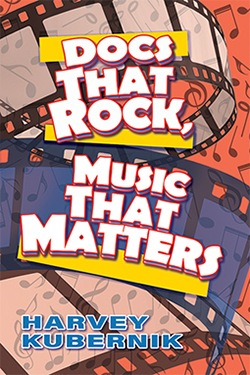
“And most recently, Richard Rothrock, author and former Screenwriting Instructor at the Motion Picture Institute, Troy, Michigan, wrote ‘[Pike] has created a fantasy that on film promises to be as visually exciting as it is enlightening, and with an equally stimulating soundtrack album, it may not wait long to find its audience’.”
Otherworld Cottage Industries has now published three of Harvey Kubernik’s 19 books, including his Docs That Rock, Music That Matters featuring interviews with D.A. Pennebaker, Chris Hegedus, Albert Maysles, Murray Lerner, Morgan Neville, Dr. James Cushing, Curtis Hanson, Michael Lindsay-Hogg, Andrew Loog Oldham, Dick Clark, Ray Manzarek, John Densmore, Robby Krieger, Allan Arkush, and David Leaf.
In 2020, author and journalist Harvey Kubernik was a Consultant for the 2-part documentary Laurel Canyon: A Place in Time directed by Alison Ellwood. Kubernik is currently working on a documentary about Rock and Roll Hall of Fame member singer/songwriter Del Shannon. (Harvey has also been filmed for the current documentary production about former Hollywood landmark Gold Star Recording Studio and co-owner/engineer Stan Ross produced and directed by Brad Ross and Jonathan Rosenberg. Brian Wilson, Herb Alpert, Richie Furay, Darlene Love, Mike Curb, Chris Montez, Bill Medley, Don Randi, Hal Blaine, Shel Talmy, Richard Sherman, Don Peake, Kim Fowley, Johnny Echols, Gloria Jones, Carol Kaye, Marky Ramone, David Kessel and Steven Van Zandt have been lensed.
Otherworld Cottage Industries invites you to explore its catalog, read its reviews, and interviews, preview its books, view its video clips and trailers, listen to its music, and visit its exclusive Kubernik’s Korner.
Otherworld Cottage’s books, music and videos are currently sold by Amazon and other select vendors worldwide.
Visit otherworldcottageindustries.com to learn more about Travis Edward Pike’s history, products, awards and Otherworld Cottage’s new customer-friendly online store currently in development, due to go online no later than July 1.
Contact: [email protected]

